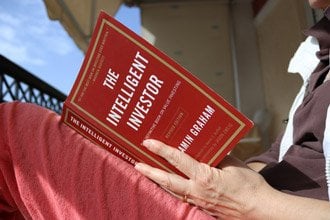By MIKE BUTTA, Associate Editor, Money Morning • September 15, 2020
Editor’s note: This comprehensive list of company names, tickers, and prices you should target has shocked a lot of folks. And so has this list of stocks to avoid touching with a 10-foot pole. Some of these are the most popular names on the market. And if you own one of these today – Shopify, IBM, Dell, Nordstrom, or JPMorgan – you may have a problem. Watch this video.
Dear Red Alert Reader,
 Reading the best stock market books is the tried and true way to sharpen your investing approach and consistently deliver returns that beat the stock market.
Reading the best stock market books is the tried and true way to sharpen your investing approach and consistently deliver returns that beat the stock market.
In today's "click bait culture," all the noise from the media often distracts us from our core principles and time-tested investing philosophies.
Editor's Note: Want to learn even faster? Check out our free investing courses to start making money today…
So, turning off the TV and diving into a great book is one of the best ways to get back to the basics.
Re-reading old books can even help you pick up on something you didn't catch the first time around.
Whether you're a beginner investor or an experienced veteran, you should find these books very helpful during your investing career.
Here are the 10 best stock market books to read now…
No. 10: "The Price of Tomorrow": by Jeff Booth
"The Price of Tomorrow" by Jeff Booth is hands-down the best stock market book published in 2020. That's because it's so relevant to what's happening in the world today.
In the book, Booth details the realities technology is having on our economic present and future.
Technological advances are happening at a rate faster than our ability to understand them… and governments' ability to regulate and develop policies for them.
But as the world moves faster than we can imagine, Booth argues we cannot afford to stand still.
Learn How to Invest Today
We created the Money Morning Profit Academy for readers like you. These courses are completely free for our readers because we believe achieving financial freedom is for everyone.
Our experts will show you everything you need to start making money today.
Here's just a taste of what you'll learn…
- How to open an account and buy your first stock.
- How to generate above-average returns.
- How to protect your profits so you keep more of what you earn.
- The investing secrets Wall Street saves for itself.
Just click here to start learning now.
These advances in technology bring efficiency and abundance. But they are profoundly deflationary since Moore's Law proves that the price of tech drops by half while doubling in processing power roughly every 18 months.
Simply put, tech works against the U.S. Federal Reserve's 2% inflation target.
Just last week, the Fed announced it's going to try to increase inflation here in the United States since it's been well under that for most of the time since the Great Recession. But in "The Price of Tomorrow," Booth explains why that's difficult due to constant technological advances.
The economic systems we currently use were built for a pre-technology era. That's when labor and capital were linked. It was an era that counted on growth and inflation – where we made money from inefficiency. That era is over, but we keep pretending those economic systems still work.
But in reality, the only thing driving growth in the world today is easy credit (Booth argues). It's being created at a pace that is hard to comprehend ($5 trillion was printed over the last five months to deal with COVID-19, for example). And the more we print, the more unlikely we are to pay back this debt.
Best Stocks: Three of the best stocks to consider buying today: These picks belong in every portfolio. Learn more…
As we try to artificially drive an economic system built for the past, Booth explains why we are creating more than just economic trouble. But there are still solutions we can implement to save the economy from long-term problems if we start today.
Booth thinks we need to build a new framework for our local and global economies, and soon. We also need to accept deflation and embrace the abundance it can bring. Otherwise, the same technology that has the power to bring abundance to us and our world will instead destroy it.
No. 9: "Think and Grow Rich," by Napoleon Hill
"Think and Grow Rich" was written during the Great Depression, and has since sold more than 100 million copies worldwide.
The author, Napoleon Hill, conducted extensive research based on his associations with some of the wealthiest individuals alive during his lifetime.
One of them was Andrew Carnegie, who suggested Hill publish this book.
In it, Hill revealed his 13 principles for success and personal achievement from his observations on about 500 wealthy and successful individuals, including Henry Ford, Thomas Edison, J.P. Morgan, John D. Rockefeller, and more.
The principles include desire, faith, auto-suggestion, specialized knowledge, imagination, organized planning, decision, persistence, power of the master mind, the subconscious mind, the brain, and the "sixth sense."
This book conveys valuable insights into the psychology of success and abundance and should be considered a priority read given modern day's emphasis on shock-value entertainment and negative news.
No. 8: "How to Win Friends & Influence People," by Dale Carnegie
"How to Win Friends and Influence People" is a classic self-help book written by Dale Carnegie in 1936.
With over 30 million copies sold worldwide, it's easily one of the best-selling books of all time.
The book reads as a life manual based on timeless principles like being genuinely interested in others, smiling, remembering people's names, being a good listener, making the other person feel important by talking about their interests, and more.
The core idea is that you can change other people's behavior simply by changing your own and treating others as you would like to be treated.
It teaches you the principles to better understand people, become a more likable person, improve relationships, win others over, and influence behavior through leadership.
Legendary investor Warren Buffett credits much of his success to a $100 class based on the book that he took with Dale Carnegie back in 1952.
And his office shows more than enough proof.
"I don't have my diploma from the University of Nebraska hanging on my office wall, and I don't have my diploma from Columbia up there either – but I do have my Dale Carnegie graduation certificate proudly displayed," he said in an interview with CNBC in 2019.
"That $100 course gave me the most important degree I have. It's certainly had the biggest impact in terms of my subsequent success," Buffett said.
No. 7: "Influence: The Psychology of Persuasion," by Robert Chaldini
In this highly acclaimed best-selling book, Dr. Robert B. Cialdini, the No. 1 expert in the field of influence and persuasion, explains the psychology of why people say "yes." And he teaches you how to apply these principles ethically in business and everyday situations.
In "Influence," you'll learn the six universal principles of influence, how to use them to become a skilled persuader, and how to defend yourself against dishonest influence attempts.
The six principles include reciprocation, commitment and consistency, social proof, liking, authority, and scarcity.
50 Stocks, Ranked from Best to Worst
Big companies are about to get bigger. Some small companies are expected to hit a growth spurt. And a few long-time blue-chip stocks are nearing extinction. For a comprehensive list of 50 stocks that are clear buys and sells, go here.
Backed by Dr. Cialdini's 36 years of research, "Influence" is a comprehensive guide to using these principles effectively to amplify your ability to change the behavior of others.
Fun fact, "Influence" is Charlie Munger's favorite book of all time. Munger is Warren Buffett's right-hand man at Berkshire Hathaway Inc. (NYSE: BRK.A).
Munger loved it so much when he read it for the first time back in 1984 that he actually gifted Dr. Cialdini one share of BRK.A (worth about $1,250 at the time).
Fast-forward 36 years, and Cialdini has never Cialdini has never sold the share given to him by Munger.
In fact, he's become great friends with Buffett and Munger over the years and comes to every Berkshire Hathaway shareholder meeting to meet fans and sell more of his books.
Of course, Cialdini has purchased more Berkshire stock along the way. And today, the stock sits at about $330,000 per share. Not a bad return on investment…
No. 6: "The Education of a Value Investor," by Guy Spier
This book traces the arc of a transformation of author Guy Spier.
Spier started his career in finance as a Gordon Gekko wannabe – arrogant, short-sighted, and out to make money for himself at whatever costs possible.
Then, a series of transformations and self-realizations led him from an investment banking job with an ethically questionable company to managing his own fund, which has generated tremendous returns for his investors.
His journey began with the discovery of Ben Graham's "The Intelligent Investor." That took him on a path to a life-changing meeting with the renowned investor Mohnish Pabrai, which lead him to have his famous lunch with Warren Buffett. That $650,100 meal with Pabrai proved to be a bargain, teaching Spier some of the most valuable lessons of his life.
Along the way, Spier has gained many powerful insights about investing and business. That includes why a top-notch education can get in your way; why self-knowledge is so critical to becoming a great investor; how the right mentors and role models are the key to long-term success as an investor; and how Buffett taught him that the ultimate goal in life is to be true to yourself.
This book is an extremely honest memoir that will take you into some of the darkest corners of Wall Street. It's also a remarkably smart and practical guide to what it takes to become a successful investor.
No. 5: "The Dhando Investor," by Mohnish Pabrai
In a straightforward manner, "The Dhandho Investor: The Low-Risk Value Method to High Returns" lays out the powerful framework of value investing.
Written with the intelligent individual investor in mind, this comprehensive guide breaks down the Dhandho capital allocation framework of the business-savvy Patels from India. And it presents how investors can apply it successfully to the stock market.
The Dhandho method expands on the groundbreaking principles of value investing expounded by Benjamin Graham, Warren Buffett, and Charlie Munger.
You will be introduced to important value investing concepts such as, "Heads, I win! Tails, I don't lose that much!"
Another one of Pabrai's favorite investing frameworks include, "Few Bets, Big Bets, Infrequent Bets," Abhimanyu's dilemma, and using the Kelly Formula to invest in undervalued stocks.
Using a light, entertaining style, Pabrai lays out the Dhandho framework in an easy-to-use format.
Any investor who adopts the framework is bound to improve on results and soundly beat the markets and most professionals.
No. 4: "The Essays of Warren Buffett: Lessons for Corporate America," by Warren Buffett
In his essays, Warren Buffett provides his views on a variety of topics relevant to corporate America and shareholders.
Young investors can get a glimpse of the interface between a company's management and its shareholders, as well as the thought processes involved in enhancing a company's enterprise value.
Buffett's essays include discussions on corporate governance, finance, investing, alternatives to common stock, mergers and acquisitions, accounting and valuation, accounting policy, and tax matters.
Buffett outlines his basic business principles, and as the steward of Berkshire Hathaway Inc., he informs the shareholders of the company that their mutual interests are aligned.
Buffett has a philosophy of bringing in talented managers at portfolio companies and leaving them alone.
He advocates purchasing shares of businesses at times when these stocks are trading at a discount from their inherent value – being "greedy when others are fearful."
At the same time, he opposes following investing trends and thinks investors should be "fearful when others are greedy."
Investors interested in reading more of Buffett's writing can go to Berkshire Hathaway's website and read his letters to shareholders dating back to 1977 for free.
And if you're interested in reading a biography on Buffett himself, check out "The Snowball: Warren Buffett and the Business of Life" by Alice Schroeder.
No. 3: "Poor Charlie's Almanack," by Peter D. Kaufman
As mentioned previously, Charlie Munger is Warren Buffett's long-time partner at Berkshire Hathaway.
Content with being the lesser-known of the two, Munger is no less impressive.
Bill Gates says that Charlie "is truly the broadest thinker I have ever encountered."
Of their 50-year partnership, Buffett "couldn't be more grateful" for their friendship and says Charlie fits the profile of the ideal partner who is "both smarter and wiser."
Three stocks every investor should consider owning today, and dozens of stocks to drop immediately: Click here…
Poor Charlie's Almanack is a collection of Charlie Munger's best advice given over 30 years, in the form of 11 speeches given as commencement addresses and roundtable talks.
In all his talks, he shows wit, rationality, and incredible clarity of thought in business, investing, and life itself.
Charlie's unique worldview, what he calls a "multidisciplinary" approach, is a self-developed model for clear and simple thinking while being far from simplistic itself.
 No. 2: "The Intelligent Investor," by Ben Graham
No. 2: "The Intelligent Investor," by Ben Graham
This book was written in 1949 and has been hailed by Warren Buffett as the best investing book ever written.
Benjamin Graham is considered the "father of value investing."
This book advocates the purchase of stocks that appear underpriced relative to their inherent value, which is determined through fundamental analysis.
Graham delves into the history of the stock market, showing the reader how to conduct proper fundamental analysis on stocks.
Graham discusses various ways of managing your portfolio, and will help you figure out what type of investor you want to be – a speculating, passive, or enterprising investor.
"The Intelligent Investor" is truly a foundational read for everyone who invests in stocks for the long run.
No. 1: "Margin of Safety," by Seth Klarman
This book is for investors who are all too often lured by the prospect of instant millions. In reality, it doesn't happen like that. Instead, most retail investors end up falling prey to the many tricks Wall Street has up its sleeve to get you to separate from your hard-earned money.
The uncountable number of approaches these types of investors adopt offer little or no real prospect for long-term success. Instead, they invariably run the risk of considerable economic loss. They resemble speculation or outright gambling instead of a coherent investment program.
But value investing, defined in this book as, "the strategy of investing in securities trading at an appreciable discount from underlying value," has a long history of delivering excellent investment results with limited downside risk.
Taking its title from Benjamin Graham's often-repeated admonition to invest always with a margin of safety, Klarman's "Margin of Safety" (published in 1991) explains the philosophy of value investing, and perhaps more importantly, the logic behind it – demonstrating why it succeeds while other approaches fail.
The blueprint that Klarman offers, if carefully followed, gives the investor the strong possibility of investment success.
Money Morning's First-Ever Stock-Picking Lightning Round
Money Morning is launching its first-ever stock-picking lightning round event.
Our chief investment strategist will be flying through stocks – more than 50 – telling you which to consider buying NOW and which to drop like a ton of bricks.
These picks will be coming fast and furious.
Make no mistake: This event will be rapid-fire – you will want to take notes.


